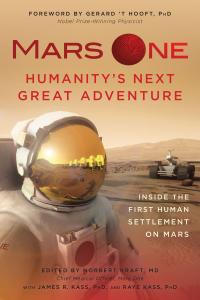MARS ONE: Humanity's Next Great Adventure: Inside The First Human Settlement On Mars
-- Norbert Kraft, James Kass, Raye Kass

Science
fiction or fact?
I've
never been one to dwell on mortality but I must say this book got me
thinking it would be nice to live well into the future in order to
see what we do and where we go as a species. And if the Mars One
Project has things their way, we'll be colonizing Mars in short
order.
“Imagine
. . . what it would be like to live on another planet, millions of
miles from Earth, and look up into the night sky, knowing that one of
the 'stars' is actually the planet on which you were born.”
Really.
Imagine it.
We
are told that in 2013, nearly 250,000 people applied to the Mars One
Project to make the one-way trip to become Mars colonizers. In the
back of the book, however, we're told, “the total number of fully
and correctly completed applications was 4,227.”
The
Mars One Selection Committee whittled that number down to just 100.
In 2016, the pool will be further reduced to 24 participants (12
women and 12 men). It is members of that selection committee who
provided the essays in this enthralling anthology.
Interspersed
throughout are quotes from Mars One applicants offering tidbits of
insights into what those potential pioneers are thinking.
One applicant said, “for the longest time, all I ever wanted to be
was an astronaut. I wanted to sail through the inky black unknown
and land, explore, and survive on a place like Mars.”
This
collection of essays covers a wide range of topics, beginning with
the need for skills. The plan is to send four people to Mars and then
four more, every 26 months. It's pretty obvious that those people
will need to have a wide range of skills but one of the most
important traits will be the ability to innovate. To hack what you
have. To think creatively.
“Your instinct for innovation will settle the solar system.”
The
essays address sociological and psychological issues such as personal
differences (age, race, ethnicity, religion), leaving everything and
everyone behind, group dynamics, building a society, and even the
potential legal issues with colonizing another planet.
The
essays also deal with the impact of being under constant surveillance
by the world – because The Mars One Project includes plans for
reality television that will document the rest of the selection
process, with the remaining candidates being recorded throughout
their training (presumably, the next ten years). It's even possible
that those trainees will have their gall bladders and appendixes
removed prophylactic-ally sometime in the next ten years to lessen the
possibility of needing acute surgery on Mars (all astronauts will be
trained in basic medical and dental procedures but they'd like to avoid major surgery).
The
authors say that their program won't be the typical reality
television show. Since I've never really watched much reality
television, I won't be able to judge that. But the authors add,
“participants will rank the order, at the end of each selection
day, of the three teammates with whom they want to continue.”
And,
“the reward for the winners will not be money, but further
education and training . . .”
There
are also two pieces of short fiction based on the Mars One Project
long-term plans, as well as details about the 100 current trainees –
demographic statistics and professions.
The
book doesn't cover any hard science. Yes, the authors tell us that
water will be pull out of the soil and that the settlers will grow
their own food and create their own fuels by splitting molecules of
water. (As a gardener, I find it difficult to believe they will get
enough calories for four people out of 861 square feet of garden
space.)
But
what about getting there? So far, there is no rocket capable of
flying to Mars. And there are plenty of naysayers (including a group
at M.I.T.) when it comes to this project. So is it science fiction
or fact? Time will tell. As one Mars One applicant said, “whether
or not this project succeeds, it has done so much already in sparking
interest.”
One
very telling line of the book to me is this, “enabling the ability
to imagine life on Mars, so as to properly prepare for it, is the
most important project the Mars One organization is currently engaged
in.” You have to first imagine it. I recommend you start with
this book.
I
wish to thank BenBella Books,Inc. for the electronic Advance Reader's Copy of Mars One:Humanity's Next Great Adventure.